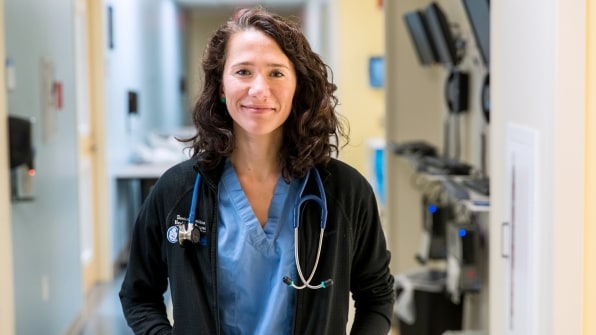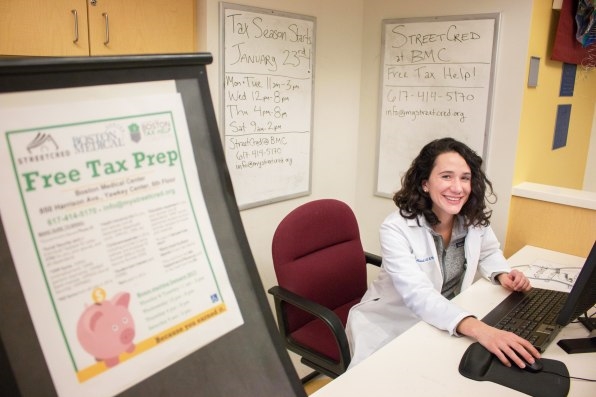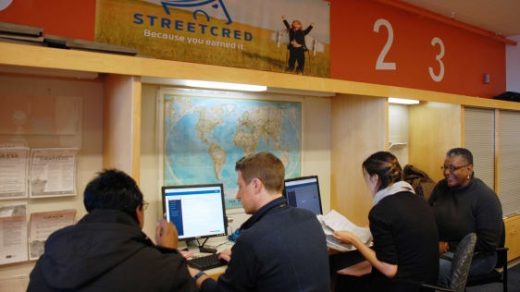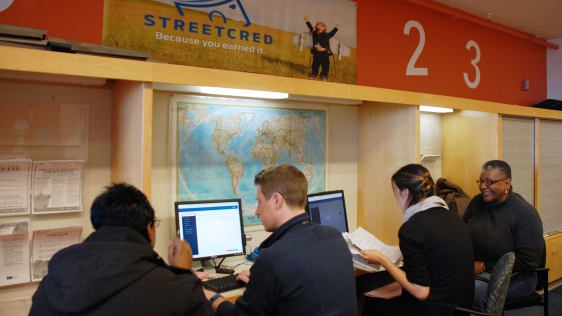This Nonprofit Offers Tax Help To Low-Income Parents In Pediatricians’ Waiting Rooms
When Lucy Marcil began her residency in pediatrics at Boston Children’s Hospital and Boston Medical Center in 2014, she elected into a track called Urban Health and Advocacy, which encourages physicians to understand how factors like economics and public policy play into health. This was not new terrain for Marcil; she’d spent several years working in the Peace Corps in Namibia, where she witnessed up close the link between personal finance and health. A group of women she met had aimed to form a collective savings group to help each other finance medications and other necessities; one was able to save enough to leave a difficult living situation, and eventually, become employed.
A bustling city like Boston is, obviously, a vastly different context than rural Namibia, but still, Marcil, along with another resident in the program, Michael Hole, saw some parallels–particularly in the waiting rooms, where, talking to parents, they’d hear stories about how medical expenses were strapping family resources, and preventing them from buying enough healthy food for meals, which in turn, compounded their children’s health problems. Hole had gone to both medical school and business school, and had done some work with the American Academy of Pediatrics researching the effect of the Earned Income Tax Credit, which is available to low-income families, on children from underprivileged backgrounds. The Center on Budget and Policy Priorities estimates that the EITC along with the additional Child Tax Credit, lifted 5 million children out of poverty in 2013, and that families who received the extra sum from the credit–which can amount to as much as $3,400 for families with just one child, and increases with the number of kids–reported better annual health outcomes.

The EITC is one of the most effective federal anti-poverty programs, particularly for families with children. But around a quarter of the families that qualify for the benefit don’t collect it, for reasons that Marcil and Hole heard repeatedly from families in their waiting rooms, once they began asking them if they’d looked into qualifying for the credit: They didn’t know it existed, or the forms were too complicated to navigate. When Hole was talking to one patient’s mother, she asked him: “Well, could you help me with it?”
That conversation led Hole and Marcil to launch StreetCred in 2015. The nonprofit has at its core a simple premise: Why not combine access to this vital government benefit with a location that many low-income families frequent: the pediatrician’s office? In 2016, around 93% of children in the U.S. visited a pediatrician’s office. Instead of sending families across town to a tax-filing or benefits consultant, Hole and Marcil decided to bring the experts to the waiting rooms to help parents there. “It’s a matter of efficiency,” Marcil says. “We just figured: Why couldn’t we make this system work better for low-income people?”

Marcil and Hole began in 2015 by first convincing Boston Medical Center and the Boston Children’s Hospital to host their program, and then assembling a small staff and team of volunteers to be trained in local partners in the particularities of filing for the EITC and CTC. Many of the volunteers, Marcil says, are hospital staffers or local community members; the StreetCred team links the volunteers up with tax experts, and schedules the pairs in shifts at the hospital, where they either help parents file for the tax credits on the spot, or help them determine their eligibility and arrange for a filing appointment at a different time.
Though it was Marcil and Hole’s vision to help low-income patients file for these credits, they very quickly realized it would not be that simple. Parents in waiting rooms are often overwhelmed and want to attend to their children, but what Marcil and Hole found was that even if they couldn’t file immediately, the idea of coming back to a known place–the health clinic–for free tax help appealed much more strongly than having to go to another location that may charge for its services. “It takes off the burden of having to figure out where the services are and get to them–instead, everything is centralized,” Marcil says.
“The thing about this model is it’s very scalable,” says Marcil, who has been awarded a 2018 TED Fellowship for her work with StreetCred. Since launching in 2015, the program has expanded to four health centers in the Boston area, and will soon be launching in five states. During the 2016 tax season, StreetCred helped around 200 families–a combined total of 450 children–collectively claim over 400,000. By 2020, they hope to up that number to $52 million to 50,000 kids.
Fast Company , Read Full Story
(49)














